|
Diamond
Pet Food Added to Recall List
 META, Mo., May 23 /PRNewswire/
-- Diamond Pet Foods announced that it has recalled a limited
quantity of Nutra Nuggets Lamb Meal and Rice Formula dry dog
food in 40 lb. bags because of melamine cross contamination.
To date, no animal deaths have been reported. META, Mo., May 23 /PRNewswire/
-- Diamond Pet Foods announced that it has recalled a limited
quantity of Nutra Nuggets Lamb Meal and Rice Formula dry dog
food in 40 lb. bags because of melamine cross contamination.
To date, no animal deaths have been reported.
This action is limited to Nutra Nuggets Lamb Meal and Rice Formula
dry dog food in 40 lb. bags with production codes of NLR0404A2SL
or NLR0404B2SL, "Best Before" Oct. 9, 2008. The recalled
product was manufactured at the company's Lathrop, Calif. facility
and sold through retailers in Arizona, California, Nevada, Oregon,
Washington, and British Columbia, Canada. No other Nutra Nuggets
products are affected.
The recalled product was manufactured at the same facility following
production of other products that contained rice protein concentrate
later found to be tainted with melamine, which is not an approved
food substance. Pets who may have consumed the affected product
should be monitored closely. Affected pets will usually drink
a lot of water and will vomit within 24 hours after eating the
food. Affected pets may exhibit the following symptoms, including
but not limited to loss of appetite, lethargy and vomiting. Consult
your local veterinarian if your pet is exhibiting these symptoms.
Consumers who purchased Nutra Nuggets Lamb Meal and Rice Formula
dry dog food in 40 lb. bags with production codes of NLR0404A2SL
or NLR0404B2SL, "Best Before" Oct. 9, 2008, should
stop using the product immediately and return unused portions
to their retailer for a full refund. Consumers may also contact
the Diamond Pet Foods Customer Information Center toll free at
1-866-214-6945 for further information. The Center, which is
staffed by veterinarians, is open Monday through Saturday from
8:00 a.m. to 7:00 p.m. CDT.
SOURCE Diamond Pet Foods
Hear this and other breaking news as it happens - Animal Radio® is streaming online 24/7 Listen LIVE Now!
Star-Studded Summer on Animal Radio®

Actor Jamie Farr, who played "Klinger" on M*A*S*H,
kicks-off the Summer of Stars on the nationally
syndicated Animal
Radio® pet show. Joining Farr Memorial
weekend is Pop Diva Sheena Easton. Also scheduled to guest
this summer is legendary singer Emmylou Harris and
the Grammy Award-winning producer and American Idol
judge, Randy Jackson. Animal Radio®
explores the connections between celebrities and their pets.
Jamie Farr once worked on a chinchilla ranch in
between jobs. He spills the scoop on other celebs' odd jobs before
they got that big break. LISTEN
Sheena Easton admits that she spoils her cats rotten
and decorates her house just for them. LISTEN
Emmylou Harris operates her own dog fostering operation
out of her home. LISTEN
Randy Jackson is a big cat lover. So, it wasn't so
strange when he adopted a kitten and named him "Dawg."
JUNE 16th
Legendary Singer Emmylou
Harris
 "Animals:
That's what I want to devote my life to now," Emmylou Harris
told Animal Radio® this past weekend. The angel-voiced
singer has been wowing audiences for decades, and as one of music's
leading vocalists, has earned 12 Grammy Awards. "Animals:
That's what I want to devote my life to now," Emmylou Harris
told Animal Radio® this past weekend. The angel-voiced
singer has been wowing audiences for decades, and as one of music's
leading vocalists, has earned 12 Grammy Awards.
"Now I am at a place where
I want to focus much more on helping [animals] and ensuring humane
treatment," she said. "That's what my passion is about
these days: ending their suffering and educating people about
animal issues."
"Animals can teach us
how to be better human beings," Harris theorized. "They've
certainly taught me that."
She offered examples of how
pets help sick patients in hospitals, reform prisoners and teens
in detention centers, act as service guides to the blind and
handicapped, bring smiles to the elderly in nursing homes, and
alert people to epileptic seizures and illnesses such as cancer.
It seems only natural that
Harris would be so concerned about animals. Her father, she said,
was training to be a veterinarian at the University of Virginia
when World War II began. He abandoned his veterinary studies
to join the armed forces, get married, and start a family. Harris
was raised near Quantico, Virginia, where her father was stationed
for more than a decade. Later, she started her music career in
Washington, D.C.
In her adult years, one of
Harris' closest canine companions was Bonaparte, a poodle mix
who traveled with her on tour and lived to age 15. She also inherited
another dog, Radar, 13 years ago when her daughter left for college.
The Cairn terrier is now both "blind and deaf, but still
an incredible friend."
These days, the musician hangs
out with her "road dog" Keeta, who was displaced by
a hurricane in 2005 but now travels comfortably on tour.
Harris also operates her own
fostering operation, which she calls Bonaparte's Retreat and
can be seen at her web site: www.emmylou.net . She has turned part of
her yard into a small shelter, complete with runs and doghouses
for up to three pooches at a time. Currently, her foster dogs
are close to or more than 50 pounds and in need of permanent
families all their own. She noted that she always tries to help
out those dogs who seem to be the hardest to place-those who
are older, have been relinquished more than once, or have been
available for adoption for a while.
The Man Who Listens to Horses
Monty Roberts
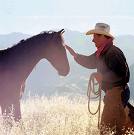 Monty Roberts, known as the "Man
Who Listens to Horses" has led an extraordinary life. An
award-winning trainer of championship horses, best-selling author,
Hollywood stunt man, foster dad to 47 children (in addition to
three of his own) and creator of the world-renowned and revolutionary
equine training technique called Join~Up, Monty Roberts could
now, in his later years, be resting on his laurels -- but that's
not his style. Monty Roberts, known as the "Man
Who Listens to Horses" has led an extraordinary life. An
award-winning trainer of championship horses, best-selling author,
Hollywood stunt man, foster dad to 47 children (in addition to
three of his own) and creator of the world-renowned and revolutionary
equine training technique called Join~Up, Monty Roberts could
now, in his later years, be resting on his laurels -- but that's
not his style.
If you go looking for Monty
Roberts, you won't find him lounging in his favorite chair high
up in the hills overlooking his horse-training farm in the beautiful
Santa Ynez Valley. Monty is more likely to be found somewhere
on the globe continuing to spread his message of nonviolence.
You're more likely to find him speaking to incarcerated youth
in a juvenile detention facility, gentling his 15,000th horse
at a demonstration, teaching his techniques to the growing number
of students at his Equestrian Academy in Solvang, California
or advising executives at Fortune 500 companies.
If you are looking for adventure,
you and your horse can join Monty on a Horse Ride Adventure from
June 27th through July 1st at the Clearwater Lodge. The lodge
also has rental horses available for gusts who aren't able to
bring a horse. And if you don't wish to ride, there is fishing,
river rafting, golfing and antique shopping. For more information,
contact Pat Roberts at patr@montyroberts.com or telephone 805-688-4382
or 805-688-3368.
http://www.MontyRoberts.com
American
Idol's Randy Jackson
 American
Idol judge Randy Jackson is teaming up with 9 Lives icon Morris
the Cat in a campaign to rescue one million homeless cats. Both
Morris the Cat and Randy are leveraging their celebrity status
to aid them in their rescue endeavor. American
Idol judge Randy Jackson is teaming up with 9 Lives icon Morris
the Cat in a campaign to rescue one million homeless cats. Both
Morris the Cat and Randy are leveraging their celebrity status
to aid them in their rescue endeavor.
"I love cats, and I've
always admired Morris the Cat, who himself was a shelter cat,"
said Randy Jackson. "Morris and I have both adopted cats
to kick off this incredible rescue effort. Morris, of course,
selected the mirror image of his younger self and named his new
buddy Li'l Mo!"
Following Morris' example,
Randy adopted a cuddly kitten of his own from a Los Angeles shelter,
and he promptly named the cute little guy "Dawg."
 Randy
Jackson, a Grammy Award winning producer, is a twenty-year music
industry veteran. He started out at the age of 13 playing bass
and got his big break when he joined the band Journey. As a musician
and producer he also spent eight years, as the V.P. of A&R
at Columbia Records followed by four years as Senior V.P. of
A&R at MCA Records. Jackson recently completed his fifth
season as one of the judges on FOX's hit television show "American
Idol" which once again garnered record breaking ratings. Randy
Jackson, a Grammy Award winning producer, is a twenty-year music
industry veteran. He started out at the age of 13 playing bass
and got his big break when he joined the band Journey. As a musician
and producer he also spent eight years, as the V.P. of A&R
at Columbia Records followed by four years as Senior V.P. of
A&R at MCA Records. Jackson recently completed his fifth
season as one of the judges on FOX's hit television show "American
Idol" which once again garnered record breaking ratings.
Hear
Randy Jackson as part of Animal Radio's Summer Season of Stars
June 16th.
RECENT Animal Radio® PODCASTS:
 Podcast JAMIE FARR (1 hour abridged
version) Podcast JAMIE FARR (1 hour abridged
version)
Podcast
LISA LaPORTA DESIGNED TO SELL (1 hour abridged
version)
Podcast
SHEENA EASTON (1 hour abridged version)
 Podcast
THE CAT WHO PLAYS PIANO (1 hour abridged version) Podcast
THE CAT WHO PLAYS PIANO (1 hour abridged version)
Podcast
HGTV's REBECCA KOLLS (1 hour abridged version)
Podcast
BETTY WHITE (1 hour abridged version)
Podcast
EMMYLOU HARRIS (1 hour abridged version)
Rebecca Kolls, Rebecca's Garden, HGTV
Gardening With your Pet in Mind
 Now
that the warm weather is here, more and more people are out in
their gardens. Which means, our pets are probably out there with
us also. Now
that the warm weather is here, more and more people are out in
their gardens. Which means, our pets are probably out there with
us also.
When planning your summer garden,
keep in mind a garden appropriate for your pets. So many times
people complain that their dogs ruin their yard and gardens.
A good hint is to watch your dog when he is in your yard. Dogs
usually have a path that they follow around the yard - so, don't
plant anything in their path. And if your dog digs, provide a
special place for your dog. Get a kiddy pool and fill it with
sand. You can even hide treats in it to encourage your dog to
dig there. If you have cats that constantly come in your yard,
plant some catnip. They will be attracted to that one area and
leave the rest of your garden alone.
Do you have yellow spots in
your yard from your dog? Try feeding him tomatoes or tomato juice.
The acid in the tomatoes has a tendency to break down the urine,
which in turn won't yellow your lawn.
And if you have slugs, remember
they are hermaphrodites, which means they do not need a partner
to multiply. If you have one slug, you will probably have 400
or more by the end of the season. Beer has been used frequently
in keeping them away, and Heineken is their beer of choice.
There are organic products
you can use on your lawn that won't harm your pets such as a
product containing corn gluten. And, since you can't be sure
what your neighbors have put on their lawns, after walking your
dog remember to wash his paws.
 Hear Rebecca Kolls on Animal Radio® Hear Rebecca Kolls on Animal Radio®
Designing for Dogs
Lisa LaPorta, HGTV
Designed to Sell
 Lisa
LaPorta co-stars on Designed To Sell (which is currently the
# 1 program on HGTV) with Clive Pearse. Lisa
LaPorta co-stars on Designed To Sell (which is currently the
# 1 program on HGTV) with Clive Pearse.
Although Designed to Sell mainly
deals with people fixing up their homes in preparation of selling,
Lisa has been asked to help design pet friendly houses. She knows
what types of fabric and flooring work best with Fido & Fluffy,
and helped design a kitchen for her brother's two Rottweilers
the secret is Travertine floors!
Lisa mentions that while Clive
seems pretty tame on the show, behind the scenes it's a different
story - he is such a goofball! Designed to Sell is gearing up
to film their 100th episode in just a few weeks. You can catch
them Monday through Friday at 8 pm EST/PT.
 For
tips on updating your property, for your own enjoyment if selling
isn't in your immediate plans, check out the book, Designed
to Sell: Make any home the hottest property on the block with
expert advice from the popular HGTV series, available everywhere
books are sold. For
tips on updating your property, for your own enjoyment if selling
isn't in your immediate plans, check out the book, Designed
to Sell: Make any home the hottest property on the block with
expert advice from the popular HGTV series, available everywhere
books are sold.
Lisa currently resides in Los
Angeles where she shares custody of her two Yorkies with her
mother.
 Hear Lisa LaPorta
on Animal Radio® Hear Lisa LaPorta
on Animal Radio®
America's Favorite Vet - Thoughts
on the recall
Dr. Marty Becker
 Dr. Marty Becker shares his honest
and frank views on the recall crisis with Animal Radio®.
He says there was an epiphany among vets when many strange cases
of early renal failure started to pop up across the country and
the recall was announced. Listen. Dr. Marty Becker shares his honest
and frank views on the recall crisis with Animal Radio®.
He says there was an epiphany among vets when many strange cases
of early renal failure started to pop up across the country and
the recall was announced. Listen.
Here are the facts as of this
newsletter.
More than 5,500 pet-food products,
house brands and name brands alike, are now on the FDA's recall
list. The first recall was the largest, of more than 60 million
containers of "cuts and gravy" canned or pouched food
that turned out to have wheat gluten tainted with melamine, which
is used in the manufacture of plastic countertops, cleaning agents,
glue and fertilizer. Those products were all made by Menu Foods,
under almost 100 different brand names.
Subsequent recalls have included
dry foods, and foods containing rice protein concentrate. More
recalls are expected as these companies voluntarily pull products.
(Note on the human food chain: "Salvage" pet food was
fed to hogs and chickens in several states, and the same targeted
ingredients as have gone into pet food is also used in the manufacture
of food for human consumption. It has yet to be determined by
the FDA and USDA if any such product or food animals contaminated
with such products has been eaten by anyone.)
The official recall list is
the FDA's, but our experience has shown us that
Pet
Food Tracker and The Pet Food List as well the AVMA's list update more quickly than the
FDA.
Important: Check your pet foods
against these lists, and then check again. Changes and adjustments
are seen on the lists on a frequent basis.
If you have a pet who has eaten
any of the recalled foods -- even if there are no symptoms --
call your veterinarian. As we've said before, you'll be buying
yourself peace of mind, and maybe saving your pet's life. If
your pet is sick -- vomiting, increased thirst, increase or lack
of urination, lethargy, bad breath, diarrhea or lack of appetite
-- you have an emergency situation, and your pet needs a veterinarian
now.
If you want to be sure that
your pet is eating the right food, check with your veterinarian.
He or she will know the current status of your pet's health and
their history, and will be better able to point you in the right
direction of the proper foods for your pet.
If you feel your pet may have
suffered kidney damage, ask your veterinarian about a test called
E.R.D.
(Early Renal Disease)
http://www.DrMartyBecker.com
 Hear Dr. Marty
Becker on Animal Radio® Hear Dr. Marty
Becker on Animal Radio®
Autographed Dog Collars
 Kyle
Orent, an 8-year-old from Northport, New York has raised more
than $20,000 for Canine Companions for Independence through sales
at his lemonade stand. His next endeavor is to raise an additional
$10,000 for the non-profit organization, which trains dogs to
help people with disabilities, through celebrity autographed
collars that are auctioned off. Kyle
Orent, an 8-year-old from Northport, New York has raised more
than $20,000 for Canine Companions for Independence through sales
at his lemonade stand. His next endeavor is to raise an additional
$10,000 for the non-profit organization, which trains dogs to
help people with disabilities, through celebrity autographed
collars that are auctioned off.
With the generation donation
of 100 collars from Bamboo,
Kyle has his collars and is in the process of contacting celebrities
for their autograph. The collars will then be auctioned off to
benefit the Canine Companions for Independence. When asked why
he chose this charity, Kyle says he is a big animal lover and
likes how these animals have been trained to assist their humans
and wants to help.
Animal Radio®
will be checking in with Kyle on a regular basis to see how the
celebrities are responding.
http://www.CanineCompanions.org
 Hear Kyle Orent
on Animal Radio® Hear Kyle Orent
on Animal Radio®
Veterinary Minute
on Animal Radio Network
with Dr. Jim Humphries |
Traveling with Pets Doesn't
Have to Drive You Crazy
 With
their own seatbelts, luggage and collapsible food and water bowls,
our pets are now, more than ever, ready to travel with us. So,
what can you do to insure that your pet will arrive safely and
ready to enjoy your vacation? With
their own seatbelts, luggage and collapsible food and water bowls,
our pets are now, more than ever, ready to travel with us. So,
what can you do to insure that your pet will arrive safely and
ready to enjoy your vacation?
According to a survey of pet
owners by the American Animal Hospital Association (AAHA), more
than 53% of dog and cats will travel with their owners. With
the upcoming busy travel season, what are the best ways of traveling
with your best friend?
Of the 4 major travel choices
that Americans have, pets are not allowed to travel on half of
them. According to the American Veterinary Medical Association
(www.avma.org),
pets are prohibited from traveling by bus or train in most states.
That means that our friends will either be flying the friendly
skies or rolling down Route 66 with us during our time away from
home. In both cases, there are many simple things that pet owners
can do to insure their pet's comfort and safety during the trip.
It has been said that "an
ounce of prevention is worth a pound of cure". For pet owners
preparing to travel by plane or car, a few ounces of preparation
and time will prevent future heartaches and frustrations on the
trip. First, make sure that your pet has proper identification
on him or her at all times. This can be something as simple as
an ID tag on his collar, but a more permanent solution would
be the use of an implantable microchip. Next, make sure you have
copies of vaccination records and needed medications easily accessible
during the trip. You might even ask your family veterinarian
for a recommendation of an emergency hospital near your destination.
And finally, do your homework. Some airlines and travel sites
may require a health certificate for your pet. This document
must be dated within 10 days of the start of your travels.
For pets who will be flying
with their owners, good communication with the airlines is a
must. In all cases, your four legged friend needs to be over
8 weeks old and weaned for at least 5 days. Most airlines will
require the above mentioned health certificate and all recommend
arriving at the airport early to insure the smooth check-in of
your pet. Kennels that will be checked into the cargo area must
be non-collapsible, large enough to allow the pet to stand and
have a leak-proof bottom covered with absorbent material. Be
sure to check the weather at home and at your destination. Some
specific breeds and individual pets may not do well, especially
during the warmer temperatures of summer. Airlines may refuse
to transport pets if the temperature exceeds 85 degrees in the
cargo hold or is less than 45 degrees anywhere along the itinerary.
American Airlines, for example, requires a veterinarian's statement
that the pet is acclimated to cold weather if the temperature
drops below 45 degrees.
Many owners are very worried
about the safety of their pets in flight and during boarding
procedures. According to the website, www.dryfur.com the majority of accidents
and injuries that happen to pets are the result of poor quality
carriers or kennels that are missing pieces. Again, a few moments
of preparation by the owner can avoid a loss or death of their
pet. And for those owners who have contemplated sedation for
their pets, the answer is a resounding NO! The AVMA, and the
American Humane Association both agree empathically that sedation
during flight is a risk pet owners should not take.
Traveling by car may be less
complex than air travel, but due to the longer time frames, owners
need to plan rest stops and exercise times for their animal companions.
The AVMA recommends that you keep a jug of fresh water in the
car to avoid times when reliable water sources may not be available.
Pets will travel better with small amounts of food and water
in their system frequently rather than allowing the pet to eat
his or her normal ration. Cats should be kept in carriers or
cages during travel to avoid potential accidents if the pet gets
"underfoot" of the driver.
When you reach your destination,
be sure that you are aware of pet-friendly hotels and campsites
in the area. Also, veterinary and animal experts recommend owners
to be "considerate" and have a kennel or crate available.
There are many sites online that can help you find lodging that
allow pets. At www.petswelcome.com,
over 25,000 hotels and other locations that allow pets are listed.
For owners who will be camping with their dogs, veterinarians
recommend the application of a topical flea and tick preventative
to help avoid bringing home any unwanted guests.
Just like their owners, many
pets are individuals and won't accept the changes that travel
brings to their lives. For these pets, having the name of a good
local boarding kennel or reliable pet sitter is probably a smarter
idea. Online resources include the American Boarding Kennel Association
(www.abka.com)
and the National Association of Professional Pet Sitters (www.petsitters.org).
As always, your family veterinarian likely has information about
local facilities that he or she trusts with the care of your
pet.
So, as the busy travel season
gets underway, remember that many problems and potential injuries
can easily be avoided with a little bit of preparation and homework.
Be sure and talk with your veterinarian about your pet's special
travel needs and what he or she recommends for traveling. To
learn more about vacationing with the four-legged family members,
visit www.MyVNN.com
and watch an informative video.
Dr. Humphries is a veterinarian
in Colorado Springs and the National News Director for Veterinary
News Network at http://www.MyVNN.com.
Hear the Veterinary Minute exclusively on Animal Radio®-LISTEN TO ANIMAL RADIO NETWORK NOW
| ASK THE CAT COACH with
Marilyn Krieger |
How
Do I Help My Grieving Cat?
Dear Cat Coach,
 My
cat Burrito and I are very sad. Two weeks ago we lost Burrito's
best friend Chiquita. She was 18 years old when she passed over
the bridge. Burrito is 12 years old and Chiquita had been his
best friend since he was a little bitty kitten. We are both devastated
at this lost, though I know in my heart that it was Chiquita's
time and that she lived a rich and fulfilled life. I am very
worried about Burrito. He walks around crying, searching for
her in all of the places she used to love to sit. Her favorite
spot was by the living room window, where she and Burrito would
sit and watch the outside world. Burrito cries all of the time
now, and is barely touching his food. I'm worried that Burrito
is going to die of grief. What should I do? Should I get a pet
kitten for him? Watching Burrito grieve is making me even more
sad and depressed. I'm finding I'm crying with him. Please help
us My
cat Burrito and I are very sad. Two weeks ago we lost Burrito's
best friend Chiquita. She was 18 years old when she passed over
the bridge. Burrito is 12 years old and Chiquita had been his
best friend since he was a little bitty kitten. We are both devastated
at this lost, though I know in my heart that it was Chiquita's
time and that she lived a rich and fulfilled life. I am very
worried about Burrito. He walks around crying, searching for
her in all of the places she used to love to sit. Her favorite
spot was by the living room window, where she and Burrito would
sit and watch the outside world. Burrito cries all of the time
now, and is barely touching his food. I'm worried that Burrito
is going to die of grief. What should I do? Should I get a pet
kitten for him? Watching Burrito grieve is making me even more
sad and depressed. I'm finding I'm crying with him. Please help
us
Grief Stricken
Dear Grief Stricken,
I am so sorry to hear about
Burrito and your loss. I know that all of the readers of this
column empathize with your grief. Most of us have lost an animal
companion that we've adored. Please take some comfort in knowing
that you provided a loving wonderful home for Chiquita. It doesn't
get much better then that.
The loss of an animal we've
shared our life with can be very traumatic for us and the other
animal companions in the household. Refocusing both Burrito and
you on other activities will help you get through the grief.
Regular activities will also help to bond Burrito more to you
and will stimulate his mind. Environmental enrichment is also
important to help Burrito transition out of the trauma from the
loss of his best friend. Additionally, it's important for you
to try to genuinely bolster your mood. I know that is going to
be hard, but it's important for Burrito's recovery since animals
are very good with picking up on our moods.
It is essential that Burrito
eat and keep up his strength. Since his appetite isn't what it
should be, entice him with his favorite treats. If he refuses
to eat, and isn't restricted in his diet, try different foods
such as chicken baby food that don't contain any onion or garlic.
If he does not eat for 24 hours, or appears to be listless for
an extended period of time, please take him to the vet.
Try to keep the same schedule
with Burrito that you had before Chiquita passed. Since cats
aren't very good with change, it is very important to keep everything
as consistent as possible. Since the loss of Chiquita is a major
change for Burrito, schedule regular times for feeding, grooming,
play, clicker training, bed time, etc.
If Burrito likes to be groomed,
use a soft brush and combine the grooming sessions with gentle
massages and petting. Since the grooming session should be a
positive and relaxing experience, don't pull at his fur to untangle
a knot. Do your best to have the grooming session every day at
the same time. Let Burrito decide the length of time for the
sessions. He may decide he's had enough after ten seconds or
30 minutes. Don't force him to be groomed, remember it should
be an enjoyable, relaxing activity.
Another activity that will
help both you and Burrito is clicker training. Clicker training
is a great way to stimulate Burrito, will give him something
to focus on and bond him more to you. Clicker training shapes
behavior through a reward system. It doesn't matter what you
teach Burrito to do, the process and the activity is important
for helping both you and Burrito through this time. It is important
to keep in mind that everything you do with Burrito should be
nurturing, fun and positive.
A clicker is a small rectangular
box that is available at most pet stores or through Karen Pryor's
site: www.clickertraining.com
. When it is depressed it makes a click. "Charging the clicker"
is the first step involved in clicker training. Charging the
clicker means associating a treat with the clicker. It is very
easy to do, is accomplished by clicking and then immediately
giving Burrito a treat. This is repeated about twelve times in
succession until he associates the clicker sound with a treat.
Since Burrito isn't eating very much right now, use a treat that
is particularly tasty to him, helping to stimulate him to eat.
If the treat doesn't motivate him, try motivating him through
affection. Some cats are not food motivated, but can be motivated
through affection or play.
After the association is made
between the clicker and a treat, use the clicker to "capture
a behavior" and then reward for it. The first behavior that
is recommended to capture is touching a target. Chop sticks make
good targets. Hold the chopstick in front of Burrito's nose,
and when he touches it, click and reward him. Immediately after
he touches the target, click and then give him a treat. After
Burrito understands targeting, hang a verbal cue on it. Present
the target, say the word "touch", click and treat.
A very good resource for learning about clicker training is a
book by Karen Pryor called Clicker training for Cats.
My description of clicker training is only a very basic and
quick overview, read Karen's book for complete and thorough instructions
on how to clicker train your cats.
Enrich Burrito's environment
by hanging bird feeders outside a couple of windows. Make sure
there are either cat trees or comfortable window sill extenders
that Burrito can comfortably sit on to observed the birds in
the feeders. When you are away from home for long periods of
time, turn the TV on or play videos such as The Cat Sitter or
Video Catnip for him. Also, provide him with treat balls, filling
them with a treat that he loves.
I do not recommend getting
a pet kitten for Burrito. Bringing a new cat into the household
is always a stressful experience for both the resident cat and
the new cat. Burrito is already stressed from the loss of his
bonded mate, and a new kitten will only compound the stress.
Be patient and loving, with
time and a little work, both you and Burrito will get through
this rough time.
Marilyn Krieger, CCBC is
a Certified Cat Behavior Consultant. She can be reached for phone
or on-site consultations to help solve cat behavior problems
either by e-mail marilyn@thecatcoach.com
or by phone: 650 780 9485. Additionally, Marilyn teaches cat
behavior classes and is available for speaking engagements. You
can find out more about The Cat Coach at http://www.thecatcoach.com Marilyn is certified
through The International Association of Animal Behavior Consultants.
Copyright May 2007 Marilyn Krieger.
Animal
Radio® made possible by: SCOOP
FREE AUTOMATIC LITTER BOX
 Who's
the next ScoopFree Star? Create your own commercial contest.
Attention cat lovers! Does your cat have that certain "star"
quality? Have you ever wanted to create your own commercial?
Do you have what it takes to make it in Hollywood? Here's your
chance - The "Who's the next ScoopFree Star?" contest
from Lucky Litter. We even provide product info, artwork, music
and video clips for use in your commercial. All you need is a
great idea and a video camera (a cat and a self-cleaning ScoopFree
litter box couldn't hurt). Good luck! Visit ScoopFree to gert started. Who's
the next ScoopFree Star? Create your own commercial contest.
Attention cat lovers! Does your cat have that certain "star"
quality? Have you ever wanted to create your own commercial?
Do you have what it takes to make it in Hollywood? Here's your
chance - The "Who's the next ScoopFree Star?" contest
from Lucky Litter. We even provide product info, artwork, music
and video clips for use in your commercial. All you need is a
great idea and a video camera (a cat and a self-cleaning ScoopFree
litter box couldn't hurt). Good luck! Visit ScoopFree to gert started. |
Every Life Matters: An Opinion/Editorial
Piece
Tammy S. Grimes, Founder, Dogs Deserve Better
I question a society where
those who step up to save a dying animal are arrested and prosecuted;
yet those who allow an animal to suffer and die in their very
own yards are rarely brought to justice and seldom even charged
with more than a minor infraction.
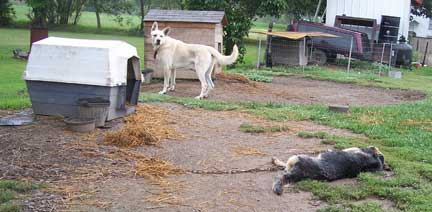 I am slated to stand trial for
theft and receiving stolen property for aiding a dog who lay
chained, unable to stand, and dying in it's owners' yard for
three days. May 21st I was back in court to choose a jury in
Hollidaysburg, Pennsylvania. I am slated to stand trial for
theft and receiving stolen property for aiding a dog who lay
chained, unable to stand, and dying in it's owners' yard for
three days. May 21st I was back in court to choose a jury in
Hollidaysburg, Pennsylvania.
Ironically, May 21st was also the day the Good Mayor of a town
in Minnesota goes back to court for a crime involving his chained
dog. In this case the defendant sentenced his "wire-haired
hunting dog" (we'll call him Wiry for short) to death by
freezing in sub-zero temperatures, with only a feces-laden crate
for shelter. He is charged NOT with animal cruelty, as one who
has any faith in the justice system would expect, but instead
with failure to provide proper housing, a 'petty misdemeanor'
charge.
His 'petty misdemeanor' charge is even less for KILLING his dog
than my 'misdemeanor' charge is for SAVING a dog. Am I the only
one who sees a problem in this scenario?
Neighbors say they heard the dog crying for help. None came.
Before heading to archives, the comment section on the Good Mayor's
news story at sctimes.com numbered 105 comments and still climbing,
indicative of a story that raises serious moral and ethical questions.
One of the more pressing questions on people's minds was "If
the neighbors heard the dog crying, why didn't they step up to
help?"
A person identifying him/herself only as Fed Up stated the story
was indeed true, ahe/she had personally heard the dog's cries
for help. Indignant questions of "Why didn'you DO something"
met only with silence from Fed Up.
As one embroiled in the same ethical/moral dilemma that Fed Up
faced, I truly empathize with his/her plight. Since my arrest,
I have endured personal onslaughts of my character from the district
attorney, police chief, and other organizations as well as from
strangers, new-found enemies, and former friends. They range
from mild (she broke the law, period) to the irrational (all
the evidence is faked, any eighth grader with photoshop could
have created both the photos and the video-fyi, my son is in
eighth grade, but insists he has NO idea how to work photoshop,
so I've proven that one wrong, thank God...)
Fed Up was caught in a moral dilemma, and had to make a choice
between his/her own personal safety and the safety of the dog.
We know which choice Fed Up made. He/she now has to live every
single day with the guilt created by this decision. Fed Up may
well endure nightmares and go to the grave with the guilt of
Wiry's death heavy on his/her conscience.
Given what I've had to endure at the hands of local authorities
as a result of my decision to save Doogie, I can certainly understand
why someone would not choose to act to save the life. How much
worse would it have been for Fed Up to save the MAYOR's dog?
The Good Mayor would have plenty of community pull, and Fed Up
would be tarred, feathered, and hanged by daybreak, any thoughts
of Wiry's mistreatment and impending doom completely forgotten
and rationalized away by authorities and community members alike.
They would all wonder what got into that darn neighbor, usually
such a nice, quiet citizen...why would Fed Up suddenly go berserk
and start stealing the private property of the Good Mayor? It
would make no sense in a justice system centered on dogs as nothing
more than property, having no feelings or right to life in and
of itself.
I myself was duly notified by the Upstanding Police Chief that
if I ever came near his dog, he'd put a slug in my ass. He also
stated in the Daily Collegian that my video could well have been
faked, that he could take his dog out, drag it through the mud,
and get horrible-looking video like that too. But Mr. Police
Chief, would not that very act of dragging your best friend through
the mud actually constitute abusive behavior on your part? As
you probably have no fear of being prosecuted, I can see why
you would feel free to envision such a form of torture for your
pet.
Until we force our nation to evolve, acting as a Good Samaritan
for dogs on chains will be a "damned if you do, damned if
you don't" kinda' thang. If you DO step up to save thlife,
you may well be the one arrested; and if you don't, you will
live with the poor creature's death on your head for all eternity.
Not a pleasant choice by any stretch of thimagination.
I am certainly not the first to take action to save a dying chained
dog. I may be the first to get such compelling evidence of the
crime committed against the dog, to fight for the right of a
dog not to die on the end of a chain, and to stand for my right
to act as a Good Samaritan. I won't be the last.
Fed Up is not the first to let fear stop him/her from saving
a life, and Fed Up will not be the last.
The Good Mayor and Doogie's owners are not the first and will
not be the last to get away with animal cruelty by allowing their
dog to die on the end of a chain. They are merely links in a
chain of abuse that has been ongoing for centuries, and which
only we can stop.
It's up to US to make these kind of Americans a dying breed.
It's up to US to stop tolerating the abuse, start enforcing laws
protecting animals, and create stronger laws limiting chaining
for man's best friend. Every social movement succeeds ONLY when
the people stop letting fear get in the way of taking the necessary
action. When the people stand up, the power shits from abuser
to right action. Laws change, tolerance of social injustice ends.
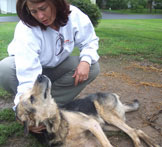 I consider myself lucky, despite
facing charges, that I am not in Fed Up's shoes. I know Doogie
would thank me if he could, and nothing man can do to me could
take that away from me. I wake up each morning knowing I did
as Jesus would have done, and Doogie's life being extended almost
six months in a loving, caring environment is more than all the
proof I need. I consider myself lucky, despite
facing charges, that I am not in Fed Up's shoes. I know Doogie
would thank me if he could, and nothing man can do to me could
take that away from me. I wake up each morning knowing I did
as Jesus would have done, and Doogie's life being extended almost
six months in a loving, caring environment is more than all the
proof I need.
Wiry never made it through the night; dying a cold, sad, lonely,
frightening death.
I urge everyone placed in the horrible position of Fed Up and
myself to push fear aside, to do whatever it takes to save the
life. If time is not of the essence, fight hard for authorities
to take the necessary life-saving steps. Don't back down to authorities
if they act like you don't know what you're talking about or
you should mind your own business. If the dog is suffering and
death is imminent, that is EVERYONE'S business!
If they refuse to take the plight of the dying animal seriously
or do not respond at all to pleas for help, realize you are on
your own, and that life is depending on YOU. You may be the only
lifeline that dog has, please do not toss it aside lightly.
Doogie's life mattered. Wiry's life mattered.
Every life matters.
Tammy S. Grimes, Founder,
Dogs
Deserve Better, Bringing Chained/Penned Dogs Into the Home
and Family through Education, Rescue and Rehab Legislation, P.O.
Box 23, Tipton, PA 16684 · 814.941.7447
Donate: http://www.dogsdeservebetter.com/donations.html
 Hear Tammy Grimes
on Animal Radio® Hear Tammy Grimes
on Animal Radio®
Pets 911 harnessing online
video to find homes for lost and abandoned pets

Since 1998, Pets911
has been helping shelters and rescues across the country place
adoptable pets in loving homes. In the past, shelters
have been able to post descriptions and photos of pets for potential
pet parents to browse from the comfort of their own home.
Now, local animal shelters across the country can take advantage
of the latest Internet trend by also posting video of pets available
for adoption on Pets911.com.
Shelters and rescues hoping to find homes for their animals can
build a pet profile on the Pets 911 web site that includes the
option for video upload for no charge. The profile can be easily
found by potential adopters or pet owners searching for their
lost animal according to US zip code. YouTube allows people to
easily upload and share video clips across the Internet for no
cost.
"If a picture paints a thousand words than we are hoping
that a video paints a million," said Tracyann Mains, Program
Director for Pets 911. "We are excited to be taking advantage
of this new model for communicating with the public about pets
who are lost or looking for a home."
Pets 911 believes that the video which brings animals to life
online will also help to save their lives. For more information
visit Pets911.com.
Animal Radio®
is proud to partner with Pets911! Hear about the latest Pets911
activities on-air on Animal Radio®
Recently on Animal Radio®
Alaska's Lone Elephant
 Maggie, the beloved elephant at
the Alaska Zoo, has been at the center of a debate over whether
or not she should be in this state for years. Maggie, the beloved elephant at
the Alaska Zoo, has been at the center of a debate over whether
or not she should be in this state for years.
Maggie was down and couldn't
get up on her own for more than 10 hours recently and had to
get help from the Anchorage Fire Department. A 24-hour watch
was put in place, but was removed after she appeared to be doing
okay. Since then, she has been down twice. And as the 24-hour
watch was called off, no one knows just how long she was down
each time.
A recent poll that asked "Should the Alaska Zoo consider
relocating Maggie the elephant following her inability to stand
up alone this weekend? " showed results of 86% in favor
of moving Maggie to a warmer climate, with only 14% wanting to
keep her in Alaska.
Maggie originally arrived at
the zoo in 1983 as a baby. She has been alone since 1997, when
the zoo's other elephant died. View Maggie's Video.
http://www.FriendsofMaggie.net
Keep up-to-date on Maggie's daily status:
LISTEN TO ANIMAL RADIO NETWORK NOW
|
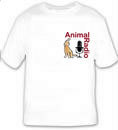 NETWORK PROGRAMS: NETWORK PROGRAMS:
Animal Radio®
Animal Wise Radio
Pet
Talk Radio!
Talk
with Your Animals
Veterinary
Minute and Animal
Minute
Voice
of the Animal
|
Currently
On-Air
Animal
Radio® Network Full-time
channel
|
LISTEN TO ANIMAL RADIO NETWORK NOW
PLATFORMS
AND PLAYERS
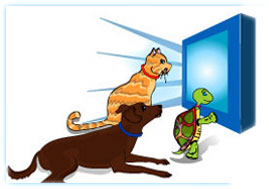 LISTEN AT WORK...all day long. Fresh animal programming 24/7.
Be sure to view our programming schedule to catch your
favorite show. LISTEN AT WORK...all day long. Fresh animal programming 24/7.
Be sure to view our programming schedule to catch your
favorite show.
PET STORES, VETS, GROOMERS: Would you like to broadcast Animal
Radio Network in your store or office? It's E-Z! Call 435.644.5992
to get set up. Animal Radio Network is simulcast on the
PetVision Network throughout America to your store.
  Listen to Animal
Radio Network's full-time Animal Channel ANYTIME on ANY CELL
PHONE, ANY PROVIDER. UpSnap now features Animal
Radio® Network LIVE 24/7. Get Pet-Food Recall
Alerts and live breaking news. Simply text "ANIMAL"
to 27627 to listen anytime FREE. (your provider's standard rates
apply). Learn more. Listen to Animal
Radio Network's full-time Animal Channel ANYTIME on ANY CELL
PHONE, ANY PROVIDER. UpSnap now features Animal
Radio® Network LIVE 24/7. Get Pet-Food Recall
Alerts and live breaking news. Simply text "ANIMAL"
to 27627 to listen anytime FREE. (your provider's standard rates
apply). Learn more.
WJTN BECOMES 94TH Animal Radio®AFFILIATE
 Animal
Radio Network™ is pleased to announce new radio affiliate
WJTN 1240 am Jamestown, New York to Animal Radio's growing
lineup. The Media One Group outlet airing Animal Radio®
Saturdays at 11am EST. Animal Radio® now airs on 94 multi-niche affiliates
including Los Angeles flagship KOST 103.5 FM. Animal
Radio Network™ is pleased to announce new radio affiliate
WJTN 1240 am Jamestown, New York to Animal Radio's growing
lineup. The Media One Group outlet airing Animal Radio®
Saturdays at 11am EST. Animal Radio® now airs on 94 multi-niche affiliates
including Los Angeles flagship KOST 103.5 FM.
Interested stations may acquire Animal Radio®
by calling 435.644.5992.
Favorites?
Have you ever felt
you were playing favorites with your kids - human or animal?
Does that create conflict inside you?
Many of us have raised human
children. We understand that if we do something for one child,
we should do for the other. At times, the child with the "problem"
draws most or all of the attention, seemingly sucking the life
out of us. We seem to not have the energy to deal with the other
child. This may seem normal. However, inside we all know, each
child deserves unconditionally our time, love and respect.
Have you ever noticed your
animal kid's behavior change because you were spending more time
and energy on someone else whether this Being is human or animal?
Well, our animal kid deserves unconditionally our time, love
and respect just as much as anyone else. From our animal kid's
perspective there are no favorites. We are always first and foremost
in their lives. Every Being whether human or animal should be
treated equally even though it's a hard thing to do when our
human heart is pulled more toward one than another. While it
may be hard, it's not impossible. There are lots of examples
of where one animal kid is being treated differently than others.
My friend has 3 cats and a
dog. Her youngest kitty stopped eating. Her mom asked, "What
is going on?" Her kitty told her that she wanted different
food and would not say why or what food it was. I talked with
the kitty. The answer was that recently most of the others' food
had been changed and she wanted the food everyone else was having.
Each animal kid eats a different meal. Her mom caters to each
one even though she tells her human family, "This is not
Burger King. You can not have it your way." Every meal,
each animal kid has his/her own bowl with their own special food
and supplements in it. It is quite the production and definitely
takes longer than pouring food from a bag into their bowls. The
kitty wanted what everyone else was having. It was finally narrowed
down to the fact she wanted food from The Natural Pet Pantry
who makes raw food. Due to an issue she has, her food needs to
puréed because she is only able to swallow liquid food.
Now her mom purées the food she wanted for her. She is
very happy.
One time the same friend went
a way for a long weekend with two of her kitties and the dog.
These 3 have health issues. The eldest kitty was left home because
she thought he would be happier at home. He loves being outside
in his back yard. Everyone came back and told him what a great
time they had and what they saw. He did not like being left at
home and missing out on their adventures. He felt that if this
was going to continually happen, maybe he should get sick so
he would not be left behind. His mom now takes him with the rest
of family. He is delighted to be included.
As many of you know, Faith
passed in January. We now have a new baby named Candie. I must
say that I am very pleased to see the way people relate to both
Braveheart and Candie. Very often people will see a puppy and
make a fuss over the baby while essentially leaving the more
mature animal out. The reason I'm very pleased is because everywhere
we go, people make a fuss over both pretty equally. Perhaps this
is because I made up my mind that if there was inequality of
attention, I would say something so both dogs got the same attention.
Very often when new animals come into a family, even the members
of the family pay more attention to the new member. This is understandable
because the new one needs to be taught what it is like to live
in the family. The key here is to be sure you pay equal attention
to the animals already in the family. In my family, that is some
trick as I live with 10 animal kids. So, for some period of time,
there is much more time being spent. In the end, it all works
out for the best of everyone.
Whether it seems it or not
our animal kids have picked us and want to be a part of our lives.
They may act independent or aloof. However, if they were not
included, they most likely would be disappointed. They want to
participate in our lives. They like feeling special just like
we do. They also like being asked and told why something is happening.
For them life is all about being loved! Also, they are our greatest
teachers regarding how we look at life.
So, spend the time it takes
for whatever you are doing with your animal kids and it will,
in the long run, take less time because you won't be trying to
correct something less than perfect for you and your kids.
Until next time, I'm Joy reminding
you, you can never love your animal companions too much. You
can only love them, hopefully, enough.
If you would like to
schedule a private session with Joy, call 425-867-1779 or go
to www.TalkWithYourAnimals.com.
If you are interested in being a caller on Talk with your Animals,
please email Martha@AnimalRadio.com
to make arrangements. Joy Turner is a regular Animal Radio®
correspondent. She can be heard daily. LISTEN TO ANIMAL RADIO NETWORK NOW
|
Animal Radio® made
possible by: American Anti-Vivisection
Society
 The
FDA has moved biotech companies one step closer to being able
to put milk and meat from cloned animals on your grocery store
shelves-without labels. Cloning seriously threatens animal welfare,
and you should have the choice to avoid these products! You can
help by calling on the FDA to keep cloned foods off of grocery
store shelves. Learn more at http://www.EndAnimalCloning.org The
FDA has moved biotech companies one step closer to being able
to put milk and meat from cloned animals on your grocery store
shelves-without labels. Cloning seriously threatens animal welfare,
and you should have the choice to avoid these products! You can
help by calling on the FDA to keep cloned foods off of grocery
store shelves. Learn more at http://www.EndAnimalCloning.org
Just because we can clone animals
for food, doesn't mean we should!
|
Appeal Filed in Morrison
County Puppy Mill Case
- Neighbors Ask Minnesota Court of Appeals to Rule on New
Conditional Use Permit Granted to Puppy Mill
 An appeal to a Conditional Use
Permit (CUP) granted by Morrison County to Gary McDuffee to operate
a large-scale, commercial dog breeding facility (a.k.a. "puppy
mill") was filed on Tuesday, May 29 by attorneys representing
neighbors to McDuffee's property. The neighbors have already
successfully appealed an earlier permit. An appeal to a Conditional Use
Permit (CUP) granted by Morrison County to Gary McDuffee to operate
a large-scale, commercial dog breeding facility (a.k.a. "puppy
mill") was filed on Tuesday, May 29 by attorneys representing
neighbors to McDuffee's property. The neighbors have already
successfully appealed an earlier permit.
Last year, the Minnesota Court
of Appeals decided that Morrison County had been arbitrary
and capricious when it granted McDuffee a permit to run a
600-breeding dog facility that also allowed for an unlimited
number of non-breeding animals and puppies.
Following that ruling, the
County held a public hearing into the matter and re-issued the
permit with 13 new conditions attached to it telling McDuffee
how he is supposed to operate the facility. The conditions cover
things ranging from the disposal of feces and dead animals to
noise management.
But, neighbors are quick to
point out that Morrison County has no system in place to ensure
McDuffee compiles with these conditions. They also point to McDuffee's
long history of failing to comply with USDA regulations, and
his apparent failure to even meet minimal Minnesota Animal Cruelty
laws.
Minnesota State Law requires
that his animals be provided with a minimum of 20 minutes of
free-choice exercise each day. During the public hearing in Morrison
County, it was learned that McDuffee had neither the staff nor
the facilities needed to provide this required exercise, in spite
of the fact that he has been in operation for about a year at
the new facility.
After leaning about McDuffees
failure to exercise his animals, in accordance with Minnesota
State law, Morrison County reduced the number of breeding animals
allowed by the CUP from 600 to 500, and added a condition to
his permit that McDuffee set aside one sixth of his facility
to be used as an exercise area for dogs. This condition, however,
does not ease the minds of people concerned about the puppy mill.
Mike Fry, Executive Director
of Animal Ark asked, "If McDuffee has been so willing to
ignore USDA regulations and Minnesota State cruelty statutes,
what makes Morrison County Commissioners believe he will comply
with their new conditions, especially when they have no way of
knowing how he is operating his facility on a daily basis?"
Since granting McDuffee his
new permit, Morrison County Commissioners have tried to deflect
criticism of their decision. In the Morrison County Record, Commissioner Duane
Johnson is quoted suggesting they had no choice but to allow
McDuffee to continue to operate. He said that, because this was
a land-use permit, the County could only consider land-use issues.
However, that appears to be
in direct conflict with the earlier ruling by the Minnesota Court
of Appeals, which, in overturning the original CUP, told the
County they had failed to take a "hard look" at many
issues relating to the CUP. The issues the County failed to consider,
according to the Court, included animal welfare, environmental
and other issues.
This case has already received
national attention. This second appeal is likely to call additional
attention to the County's policies toward large-scale commercial
breeders. There are several puppy mills operating in Morrison
County, including one owned by McDuffee's ex-wife and one owned
by McDuffee's sister. Both of these facilities have histories
of serious USDA violations.
During a related court case,
veterinary inspections of McDuffee's property were conducted
to look for potential public health concerns that could originate
from large-scale dog breeding facilities. The results of those
inspections have been sealed by a judge in Morrison County. It
is expected that attorneys for the neighbors may try to get those
inspection reports made public during this appeal.
Attorneys for Mansfield, Tanick
and Cohen law firm are handling the appeal for the neighbors,
with support from Animal Ark.
What You Can Do:
Donate to the Cause
Forward this Story to Family & Friends
Mike Fry, Executive
Director Animal
Ark No-Kill Shelter Co-Host Animal Wise Radio
Hear Animal Wise Radio on Animal Radio Network™-LISTEN TO ANIMAL RADIO NETWORK NOW
 Have you heard Animal Radio® Network
Lately? Have you heard Animal Radio® Network
Lately?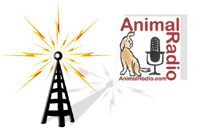
So many ways to listen!
Website: http://AnimalRadio.com
Toll-Free Studio Line is: 1.866.405.8405
- View
list of AM-FM RADIO STATIONS that air Animal Radio in your city.
Including
KOST 103.5 and KBIG 104.3 in Los Angeles
Website: http://www.AnimalRadio.com
Toll-Free Studio Line is: 1.866.405.8405
Animal Minute on
Animal Radio Network
with Britt Savage |
Is
it a Poodle or a Lamb? Hoax or not?
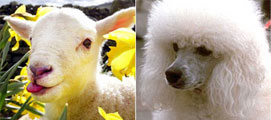 A company in Japan has been selling sheep as
poodles. A company in Japan has been selling sheep as
poodles.
A Japanese actress, Maiko Kawakami, was one of these unfortunate
people who bought a sheep thinking she was getting a poodle.
But, after proudly showing pictures of her "dog" she
was told that it was in fact a lamb. She should have known, as
her "poodle" did not bark and refused to eat dog food,
and he had hooves instead of paws.
Maiko, unfortunately, is not
the only one who was duped. Hundreds of woman fell for the same
scam. Perhaps up to 2,000 people have been conned. Sheep are
not very common in Japan, so many people had no idea what they
looked like.
The Japanese police have subsequently
shut down the online company that had been selling the sheep.
Poodles are well known as a status symbol and they were charging
up to $1,200 for these "dogs."
People who unwittingly purchased
these "poodles" have since donated them to zoos and
farms.
Britt Savage is a regular
Animal Radio® correspondent. She can be heard daily.
LISTEN TO ANIMAL RADIO NETWORK NOW
Voice of the Animal on Animal Radio Network
Rae Ann Kumelos Ph.D. |
Hippopotamus Behold
the Behemoth!
 Did you know the hippopotamus
has a starring role in the Bible? Did you know the hippopotamus
has a starring role in the Bible?
And God said to Job: "Behold
the Behemoth!"
Most experts believe that the
behemoth of the Hebrew Bible was not a mythological beast, but
a hippopotamus. Although the name hippopotamus was not available
to use until many centuries after the Book of Job was written,
hippo's presence has been reported in Egypt since 1500 B.C.,
and he was well know in Biblical times.
The hippopotamus is widely
featured in ancient Egyptian art, and hippos have even been found
embalmed in the tombs of ancient Egypt. The Egyptian goddess
of childbirth, Tauret, was portrayed as a regal pregnant hippo
with human breasts, her head adorned with the traditional Egyptian
headdress. Expectant Egyptian women wore amulets bearing the
image of the hippo-goddess Tauret.
Today, hippos live in the sub-Sahara
of Africa, some in the wild, most in parks and reserves. Their
scientific name is hippopotamus amphibious which
mean "river horse that leads a double life," because
the hippo is aquatic by day and terrestrial by night. Hippos
emerge from their river homes at twilight and will sometimes
travel for many miles to graze throughout the night. A golf course
in Uganda is a favorite hangout for one "bloat" --that
is what a group of hippos are called-they mow the grass with
their munching every night, but their wide feet also leave big
ruts in the fairway. The golfers were so upset at their golf-
balls landing in hippo tracks, that club officials made a new
ground rule: if your ball lands in a hippo's footprint, you may
remove the ball and give it a drop without being penalized.
In a National Park in the Congo, the hippos amble over at night
to a local restaurant where they stand outside and watch the
tourists play cards. Then, during the day, the tourists stroll
down to the river to watch the hippos. Huberta was a famous hippo
of the late 1920's who would wander through towns and help himself
to fruit from local stands. One time he even tried to enter a
theater where a Judy Garland film was playing. Huberta was thought
to have traveled over one thousand miles throughout South Africa,
visiting farms and villages-- even a Buddhist monastery where
he stayed for three days eating all of the shrubs and flowers.
It was believed that George Washington's famous false teeth were
carved not of wood, but of hippo teeth, probably because the
ivory of the hippo does not yellow. So if this is true then we
can be assured that our Founding Father had a glorious white
smile. Fortunately for the hippo, dentists now use porcelain
and other materials to make false teeth, although sadly, mankind
still feels the need to hunt the hippo to make silly trinkets
out of his ivory teeth.
There are many stories concerning hippos and canoe accidents.
Experts say the hippo is actually quite gentle and attacks only
if provoked, but that hippos may think that a canoe is a crocodile
after its young, since their shapes in the water are similar.
Many of the early African explorers, including Stanley and Livingston,
all had boating incidents with devoted hippo mothers.
An Azande legend tells of how hippo jumped into a river and the
fish were terrified he would eat them. The hippo assured the
fish he preferred only grass, and to prove it promised that whenever
he "dunged" he would switch his tail back and forth
to break up the dung and prove there were no fish bones in it.
There are quite a few references to hippos and their dung
not all as pleasant as this story. Apparently dung is used to
stake out territory, stage duels with rival hippos, and to fertilize
the river grasses, which allow river fish and other creatures
to live. The hippos are so important in helping to maintain the
balance of river eco-systems that when they are driven away,
the rivers die.
Hippos are often criticized for being ugly, which leads us back
to Job and the behemoth. God tells Job that His behemoth, "ranks
first among the works of God." Since according to this God,
He made us all, wouldn't we be hypocrites to think the behemoth
anything but wonderful?
Rae Ann Kumelos is a regular Animal Radio® correspondent.
She can be heard daily. LISTEN TO ANIMAL RADIO NETWORK NOW
Visit us at http://www.voiceoftheanimal.com
to hear more stories and order a Voice of the Animal CD's.
Copyright 2007
Voice of the Animal
Animal
Radio® is made possible by:
GET SERiOUS!
 - Extracts stains
& odors COMPLETELY
-in only 3 minutes! - Extracts the urine &
the pheromone -so pets aren't attracted back to re-mark! - Extracts stains
& odors COMPLETELY
-in only 3 minutes! - Extracts the urine &
the pheromone -so pets aren't attracted back to re-mark!
- Never leaves any "yellowing" behind (like
most enzyme-based cleaners) and even removes old locked-on
"yellowing" - left behind by other cleaners!
-1 bottle of GET SERiOUS! cleans as much
as 2 bottles of the competition because you only use 1/2 as much
as the others! - $AViNGS ! $AViNGS
! $AViNGS !
http://www.GetSeriousProducts.com |
Email your events to: root@AnimalRadio.com
 Meow
Madness 2007 Meow
Madness 2007
Saturday, June 9, 2007
San Diego Humane Society and SPCA
5500 Gaines Street, San Diego, CA
11 a.m.-4 p.m.
Now is the time to find the furry love of your life at the San
Diego Humane Society and SPCA's Cat Adoptathon, "Meow Madness!"
Friendly felines will be looking for a home during the event
held on Saturday, June 9th. The San Diego Humane Society
sees an increase in homeless cats and kittens from April to September
due to "kitten season," and wants to find homes for
all the fabulous felines in their care. Throughout the event
the Humane Society's experienced and caring adoption counselors
will be on-hand to "match-make" prospective pet parents
with the best companion animal for their home. Potential adopters
are asked to fill out an adoption questionnaire before they meet
with a counselor in order to help determine the most suitable
match.
For more information about
Meow Madness 2007 or to view just a few of the great adoptable
animals that will be available visit www.sdhumane.org.
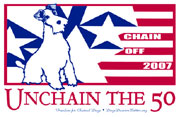 Chain
Off 2007 · Unchain the 50! Chain
Off 2007 · Unchain the 50!
4th of July
Your Backyard
8-24 hours
Freedom for Chained Dogs All Across America
This Years 4th of July Event
marks our 5th Annual Chain Off, and this Year we're going Even
Bigger than EVER, with a Goal of at least ONE PERSON per state
living chained to a Doghouse for 8-24 hours in our Fabulous "Unchain
the 50" Campaign!
We need at least 50 people
to join us! That's right, at least ONE from every state. Here's
how we've made it easy for you...
Last year's participant, Erin
Blais of Maine, BLAZED a trail for you...She lived chained to
a doghouse for 24 hours IN HER VERY OWN YARD! That's right, no
event to plan, location to get permission for, funds to raise...nothing.
And the media STILL CAME.
Many of you have been telling
us you want to do this for years, but when it came to planning
the event, it proved to be too much for you. (We understand,
it can be VERY daunting.) So this year, DON'T PLAN. Just get
yourself a doghouse, let us know where and when you will be joining
us, get a few friends to sponsor you on this hourly 'sponsor
sheet' (like a walk-a-thon), and be done with it.
We will alert your local media
and include your details on our website. Each person who chains
her/himself for 8 hours or more will receive a FREE CHAIN OFF
2007 T-shirt, as well as brochures to hand out to any interested
passers-by.
Join us today.
E-mail Dawn@dogsdeservebetter.org
with all your details.
Sponsors are needed for Chain Off 2007: Unchain the 50!
| ANIMAL
RADIO®
PRODUCT REVIEW for
June |
|
    (rated 4 out of 5 paws) (rated 4 out of 5 paws)
VitaPaw: Vitamin Water for
Your Pet
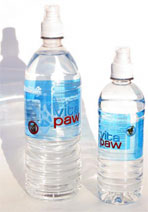 Bottled
water has become a big business for health conscious consumers.
Now those same consumers can buy a healthy vitamin-enriched water
for their dog or cat. Bottled
water has become a big business for health conscious consumers.
Now those same consumers can buy a healthy vitamin-enriched water
for their dog or cat.
This seems like a great idea
with all the recent controversy over pet food. You can now be
sure that your pet is getting the vitamins he needs on a daily
basis, as well as staying hydrated. It's so easy to substite
this for his regular water, and don't worry about overloading
him with too many vitamins, because just like humans, your pet
will pass through any nutrients he doesn't use.
It comes in handy 16.9 oz and
1 litter bottles. Visit VitaPaw
to find out where you can purchase it. And, while it is safe
enough for humans, save it for your pets!
Send products for review
on-air and in this newsletter to: Animal Radio® Network Product Reviews, 233
East 330 North, Kanab, Utah 84741. Products may not be returned.
|
| Small Dogs, Big Hearts with
Darlene Arden |
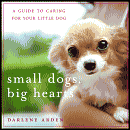 ASK "THE DOG EXPERT" - by Darlene Arden, Certified Animal
Behavior Consultant ASK "THE DOG EXPERT" - by Darlene Arden, Certified Animal
Behavior Consultant
Q. Last month, the Cat Coach,
Marilyn Krieger, said to ask you about litterbox training dogs.
Well, I'm asking because it sure sounds like a joke to me! Can
you really do that? I mean really? I have a Chihuahua and it
sure would be easier not to have to walk him late at night or
on cold winter days.
A. Yes, you can really litterbox
train a dog. In fact, more than one company makes litterboxes
and special litter (made of compressed paper) for dogs. Probably
the best known is Second Nature by Purina. I certainly wouldn't
want to litterbox train a Giant breed like a Newfoundland or
Irish Wolfhound but for small to medium size dogs this can be
an option for people who are ill and can't take their dog for
a walk in inclement weather. Little dogs lose body heat much
more quickly than big dogs so they'll need a coat or a sweater
when going for a winter walk. And if you use a litterbox you
will still need to socialize your dog. You train the dog exactly
the way you would if you were going outdoors: take him to the
litterbox each time and give him a special word so he'll learn
to associate it with doing what he has to do in the right place,
then give him a special treat and praise him lavishly. Housetraining
is housetraining and you have to be consistent whether that means
sleeping in clothes so you can take him outdoors in the middle
of the night, or getting up in your jimmies and taking him to
the litterbox. The added bonus, is for a woman alone, it is safer
to be able to take a dog to a litterbox than to be vulnerable
on big city streets in the middle of the night.
"Ask the Dog Expert"
is a regular column by Darlene Arden. This month's column features
information found in her book, "The Angell Memorial Animal
Hospital Book of Wellness and Preventive Care for Dogs,"
(McGraw-Hill), which helps you, in concert with your veterinarian,
design a wellness program based on your dog, your lifestyle and
the place where you live, and "Small Dogs, Big Hearts,"
(Howell Book House), and the newly released, "Rover, Get
Off Her Leg!" Further information may also be found on her
website: www.darlenearden.com.
Copyright 2007 by Darlene Arden. All Rights Reserved.
Hear Darlene Arden on Animal Radio® Consult schedule for showtimes.
|
Animal Radio® made
possible by: Safe-Guard
 Get
ready for spring by protecting your dog and your family
against intestinal worm infections! Did you know that eggs
and larvae that infect dogs can survive in the environment for
months even in extreme winter weather conditions? And that
those same parasites can also infect humans? Why take chances?
Make intestinal deworming an important part of your dog's routine
health care with Safe-Guard® Canine Dewormer a safe
and effective way to eliminate and prevent the major intestinal
worms that can infect dogs all year round. Just sprinkle it on
your dog's food twice a year, for complete peace of mind! Get
ready for spring by protecting your dog and your family
against intestinal worm infections! Did you know that eggs
and larvae that infect dogs can survive in the environment for
months even in extreme winter weather conditions? And that
those same parasites can also infect humans? Why take chances?
Make intestinal deworming an important part of your dog's routine
health care with Safe-Guard® Canine Dewormer a safe
and effective way to eliminate and prevent the major intestinal
worms that can infect dogs all year round. Just sprinkle it on
your dog's food twice a year, for complete peace of mind!
Visit www.Safe-Guard.com for information on treating
and preventing intestinal worms.
|
| ASK THE BIRD
FOLKS with Mike O'Connor |
Is Spraying My Fruit Trees
Bad for the Birds?
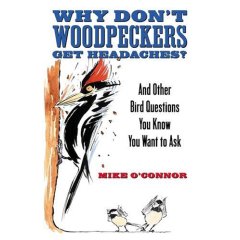 Dear Bird Folks, Dear Bird Folks,
The trees in my yard are full
of new leaves, especially the fruit trees. Soon these trees will
be filled with little black worms that will destroy their yields.
Usually I spray them with pesticides, but I've become concerned
with the birds that eat at the feeders, which are next to the
trees. Is it safe to continue to spray? With what? I don't want
to lose my fruit
-Tod, Pembroke, MA
I'm with you Tod,
Fruit rules. Even though I'm
a vegetarian, I'd much rather eat fruit. In fact, I would become
a fruitarian, but that name sounds even wimpier than vegetarian.
Fruit has it all over vegetables. Most fruits are sweeter than
vegetables, you don't have to cook any of them and fruit makes
far better desserts than vegetables. There is apple pie, blueberry
cobbler, raspberry turnovers, banana bread, strawberry shortcake,
just to name a few. What kind of desserts do vegetable give us?
Carrot cake? Oh, please.
Whether you like fruit, vegetables
or both, the trouble is we aren't the only ones who like them.
Lots of other things do too and that's where the problems come
in. Since the first humans decided that growing food was better
than chasing after it with clubs, we have been fighting off the
hordes of other creatures that mistakenly thought we like to
share. Over the years everything from fire to prayer to voodoo
to chemicals have been used to protect crops. All, except maybe
prayer, have had clear environmental impacts. The first known
chemical insecticides were made from sulfur and were used by
the Sumerians back 4,500 years ago. I'm not sure who the Sumerians
were, but if they used sulfur they probably came from New Jersey.
Today over a billion pounds
of toxic pesticides are dumped on this country each year and
the highest percentage of the dumping does not come from commercial
farmers, but from homeowners. People like you and I, Tod, are
doing more than our fair share spreading these poisons around.
The patch of emptiness that we call a lawn are a major target,
but ornamental shrubs and, yes, prized fruit trees are also sprayed,
dusted and powdered with nasty stuff.
The benefits of spraying are
immediate. We get a greener lawn, redder roses and spotless fruit.
The long term effects on us humans aren't as obvious. How these
sprays affect the people who eat the fruit or the children who
play on the lawn isn't as clear. What is clear is that pesticides
are bird killers. Birds are a 100 times more sensitive to pesticides
than mammals. It is estimated that in the U.S. over sixty million
birds die annually from pesticide exposure. The reason why we
don't find that many bird bodies is that most are quickly scooped
up by scavengers or fast food restaurants. Also, pesticides indirectly
cause bird mortality. Insect eating birds and their nestlings
may starve if spraying eliminates all the insects in an area.
Bird's mobility is part of
the problem. Because they can fly it's nearly impossible to keep
them away from a recently treated area. Birds die from direct
contact with pesticides or from eating the insects or plants
that have been sprayed. They die from absorbing toxins when they
land on a treated tree or plant. The die after drinking water
that is contaminated by runoff. It doesn't have to be water runoff
either. Hummingbirds often obtain their moisture from sipping
up the little water droplets that form on the leaves of a tree.
If those leaves have been sprayed, the tiny bird is in big trouble.
Based on the above information, Tod, you can probably guess that
I'm giving a thumbs down to your question about spraying to protect
your fruit trees. An easy alternative to spraying is to encourage
more birds to your yard. Birds would love to feed those "little
black worms" of yours to their nestlings, especially if
the worms aren't dusted with poison. In addition to your feeders,
putting out a birdbath, setting up more nest boxes and encouraging
the growth of native vegetation will draw more worm-eating birds
to your yard.
The other thing you should
do is identify which species those little black worms are. By
knowing the exact insect you are dealing with, you should be
able research a specific, nontoxic way of protecting your trees.
But for the sake of the birds, and perhaps even yourself, avoid
using pesticides. Like that Joni Mitchell song says: "Give
me spots on my apples but leave me the birds and the bees."
Good luck with your fruit trees Tod. Before I go I'd like to
make a deal with you. I won't tell any bird watchers that you
once used pesticides if you don't tell anyone that I've been
listening to Joni Mitchell. Deal?
Mike O'Connor is the owner
of the Bird Watcher's General Store on Cape Cod, which opened
in 1983 as one of the first stores in the United States dedictaed
solely to birding. His column, Ask the Bird Folks, appears weekly
in The Cape Codder, The Register, The Harwich Oracle, and The
Upper Cape Codder newspapers, and his writing was included in
the Best American Science and Nature Writing 2004. Copyright
2007 by Mike O'Connor. All Rights Reserved.
http://www.BirdWatchersGeneralStore.com
Animal
Radio® made possible by: FIDO
FRIENDLY MAGAZINE
 Fido
Friendly magazine lists accommodations where you can stay with
your dog while traveling in the United States and Canada. Each
quarter, our editorial includes hotel, city and state reviews. Fido
Friendly magazine lists accommodations where you can stay with
your dog while traveling in the United States and Canada. Each
quarter, our editorial includes hotel, city and state reviews.
http://www.FidoFriendly.com |
G'day from Downunder...
 We
all agree that one dog bite is one too many. We
all agree that one dog bite is one too many.
However here in Australia,
BSL or Breed Specific Legislation, limits on the numbers of pets
we are allowed, no pets allowed in many new developments all
of these things along with compulsory desexing of all domestic
pets are just the start of what we see as a greater subversive
movement to ensure no one ever has a pet in the future!
It's easy to blame the politicians
who make these laws, but the real problem are the activist
groups who don't want us to have pets or 'companion animals'
at all. They think ALL animals should be free and are chipping
away at our right and desire to have animals as pets in our lives.
There are increasing rules
with what we can and can't do with our dogs including (in the
USA) restricting ownership to dogs under a certain size or weight
a town in New Zealand where no dogs or cats are allowed housing
developments in Melbourne Australia with much the same restrictions,
Queensland & South Australia councils banning selected breeds
or requiring muzzles on Border Collies! (it's true!)
But the big one right now here
in Australia is thinking that dog bites can be reduced by two
things:
1) Slowly killing off the biggest
dog breeds by compulsory de-sexing
2) Forcing owners to keep larger dogs muzzled or locked up in
our backyards
Any 1st year veterinarian or
animal behaviourist can tell you dogs are more likely to be territorial
and generally more anxious if kept muzzled or locked up for any
length of time.
Of course these anxious dogs are more likely to bite.
Then Voila
the activists immediately have a reason to say that ALL
dogs bite (duh!), are dangerous and therefore they should
all be banned.
We MC'd and event recently
here in Sydney called 'Solving The Dangerous Dogs Dilemma'.
But we didn't see any dilemma... we know any dog can be dangerous
but the 'dangerous dogs' that were plenty in number on the day
all behaved impeccably.
 Any
dog can bite - just look at the close-up photo of Cosmo, our
Miniature Apricot Poodle... a wonderful 'softie', except when
he has bitten us (several times in the past) a few groomers,
a neighbour (twice) and yes - A RANGER! (but the ranger did
say afterwards they approached him the wrong way!) Any
dog can bite - just look at the close-up photo of Cosmo, our
Miniature Apricot Poodle... a wonderful 'softie', except when
he has bitten us (several times in the past) a few groomers,
a neighbour (twice) and yes - A RANGER! (but the ranger did
say afterwards they approached him the wrong way!)
Whilst it's true that some
dogs have threatened, attacked and killed humans over the years
- to our knowledge it has never been shown absolutely that a
dog ever did this out of hate, jealousy, spite, retribution,
religious or political reasons.
The same can't be said of humans.
Internationally respected animal
trainer and Pet Talk Radio co-host Steve Austin summed it up
a few years ago when the dangerous dog and BSL legislation was
first being talked about - he said: "Bad Dogs are not
born they are created by us. Let's educate the dog owners
lets educate the dogs and dog bites will drop like the proverbial
lead balloon"
That said, we'll be back next
month with something a little lighter... meantime, hugs for your
pets from Brian & Kaye
Pet Talk Radio!
Hear Pet Talk Radio! on Animal Radio Network
- LISTEN TO ANIMAL RADIO NETWORK NOW
- Check schedule for showtimes
| PAWS
UP FOR PETS with Arden
Moore |
The
Do's and Don'ts of Doggy Day Care
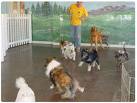 Hate goodbyes? So does your dog.
When you rush off to work each morning, all it takes is one mournful
glance or a sorrowful howl from your dog to cause those guilt
pangs to rise inside you. You feel a bit bummed that you must
leave your canine pal home alone for hours. Hate goodbyes? So does your dog.
When you rush off to work each morning, all it takes is one mournful
glance or a sorrowful howl from your dog to cause those guilt
pangs to rise inside you. You feel a bit bummed that you must
leave your canine pal home alone for hours.
At work, you may feel like
an absentee dog parent as you wonder what your dog is doing.
Is he OK? Is he happy? Worse has he turned into destruct-o
dog out of boredom or separation anxiety? When you open your
front door, what will await you?
Perhaps you will step in a
puddle on the living room carpet, eye a shredded pillow in the
bedroom or find your favorite vase in shattered pieces on the
dining room floor.
Even if you discover no doggy
misdeeds, you may find that what stands between you and that
relaxing recliner is your raring-to-go, tail-thumping dog who
is anxious to meet and greet you and unleash some energy.
Guilt overwhelms you as you
tell your dog, "Sorry, buddy, not right now." When
you left that morning, you promised to play fetch or take your
dog on a long walk when you returned home after work, but now
you're too exhausted. Your dog gives you that letdown look and
delivers a long sigh. Bottom line: you're exhausted and your
dog is frustrated.
Here's a win-win solution:
doggy day care. Once regarded as a novelty a decade ago, it is
now hailed as an essential godsend. After all, many regard themselves
as pet parents rather than mere dog owners. The latest survey
taken by the American Animal Hospital Association reports that
nine out of 10 owners consider their dogs as family members.
Just as you would search earnestly
to find a quality day care or after-school program to meet your
child's needs, apply the same dogged determination for your canine
especially if you are gone for more than eight hours each
day.
After all, dogs are social
critters who crave interaction with people and other pets. Dogs
left home alone for 10 or more hours without any creature comforts
or mind-stimulating toys can start to exhibit signs of loneliness
incessant barking, potty messes, destructive chewing and
other behavior problems.
Let me offer you these tips
to assist you in selecting the right doggy day care for your
canine chum:
- First, do an honest assessment
on your dog. Doggy day care is not the place for a dog who does
not get along with other dogs.
- Contact your local animal
shelter, groomer or veterinarian for recommendations of doggy
day care centers in your area. Chat with your dog-loving friends
to get their firsthand accounts of experiences with local doggy
day cares.
- Schedule an appointment to
visit a few centers without your dog. You don't want the distraction
of your curious canine to deter you from surveying the scene.
- Expect a complete tour of
the doggy day care. Be leery of places where the staff is reluctant
to show you where the dogs rest or play.
- Size up the center in
terms of physical size as well as the ratio of staff to dogs.
A good center should staff one employee per every four to six
dogs.
- Inspect the center for cleanliness.
Avoid centers that smell of urine and other pet odors. Floors
should be free of debris and fur balls. Fresh water should be
available to the doggy guests.
- Inquire about the amount of
time staff members walk each dog and what routes. Make sure that
the center provides bedding for dogs during nap time.
- Make certain that the staff
insist on written proof that your dog is current on his vaccinations
and flea and tick maintenance programs.
- Ask about auxiliary services
such as grooming and training classes. A timesaving one-stop
shop like this could be a determining factor in your busy life.
Some centers even offer pickup and drop-off services and overnight
boarding for times when you need to travel.
Once you've selected a center,
here comes the final test: have your dog spend a few hours at
the daycare. When you arrive, notice how the staff interacts
with your dog. Do they exhibit genuine affection and address
him by name? Then notice your dog's behavior when you return
later in the day. Does he seem happy and relaxed or anxious and
tense? The daycare must be a place where your dog feels welcomed
by other dogs and the staff.
Animal
Radio® special
correspondent Arden Moore is the editor of Catnip, the national
award-winning monthly published in cooperation with Tufts University's
School of Veterinary Medicine and managing editor of Fido Friendly.
Arden has also authored 17 books on dogs and cats, including
her latest, The Dog Behavior Answer Book, (Storey Books, 2006).
To order any of her books or reach Arden, please visit her Web
site: http://www.ArdenMoore.com
| Search Animal Radio®
Network |
|
|
LISTEN TO ANIMAL RADIO NETWORK NOW
|



 "Animals, that's what I want
to devote my life to now," Emmylou Harris told Animal Radio®.
The angel-voiced singer has been wowing audiences for decades,
and as one of music's leading vocalists, has earned 12 Grammy
Awards. She joins us for week-two of the Summer Season of Stars.
"Animals, that's what I want
to devote my life to now," Emmylou Harris told Animal Radio®.
The angel-voiced singer has been wowing audiences for decades,
and as one of music's leading vocalists, has earned 12 Grammy
Awards. She joins us for week-two of the Summer Season of Stars.
 META, Mo., May 23 /PRNewswire/
-- Diamond Pet Foods announced that it has recalled a limited
quantity of Nutra Nuggets Lamb Meal and Rice Formula dry dog
food in 40 lb. bags because of melamine cross contamination.
To date, no animal deaths have been reported.
META, Mo., May 23 /PRNewswire/
-- Diamond Pet Foods announced that it has recalled a limited
quantity of Nutra Nuggets Lamb Meal and Rice Formula dry dog
food in 40 lb. bags because of melamine cross contamination.
To date, no animal deaths have been reported.
 "Animals:
That's what I want to devote my life to now," Emmylou Harris
told Animal Radio® this past weekend. The angel-voiced
singer has been wowing audiences for decades, and as one of music's
leading vocalists, has earned 12 Grammy Awards.
"Animals:
That's what I want to devote my life to now," Emmylou Harris
told Animal Radio® this past weekend. The angel-voiced
singer has been wowing audiences for decades, and as one of music's
leading vocalists, has earned 12 Grammy Awards. Monty Roberts, known as the "Man
Who Listens to Horses" has led an extraordinary life. An
award-winning trainer of championship horses, best-selling author,
Hollywood stunt man, foster dad to 47 children (in addition to
three of his own) and creator of the world-renowned and revolutionary
equine training technique called Join~Up, Monty Roberts could
now, in his later years, be resting on his laurels -- but that's
not his style.
Monty Roberts, known as the "Man
Who Listens to Horses" has led an extraordinary life. An
award-winning trainer of championship horses, best-selling author,
Hollywood stunt man, foster dad to 47 children (in addition to
three of his own) and creator of the world-renowned and revolutionary
equine training technique called Join~Up, Monty Roberts could
now, in his later years, be resting on his laurels -- but that's
not his style. American
Idol judge Randy Jackson is teaming up with 9 Lives icon Morris
the Cat in a campaign to rescue one million homeless cats. Both
Morris the Cat and Randy are leveraging their celebrity status
to aid them in their rescue endeavor.
American
Idol judge Randy Jackson is teaming up with 9 Lives icon Morris
the Cat in a campaign to rescue one million homeless cats. Both
Morris the Cat and Randy are leveraging their celebrity status
to aid them in their rescue endeavor.  Randy
Jackson, a Grammy Award winning producer, is a twenty-year music
industry veteran. He started out at the age of 13 playing bass
and got his big break when he joined the band Journey. As a musician
and producer he also spent eight years, as the V.P. of A&R
at Columbia Records followed by four years as Senior V.P. of
A&R at MCA Records. Jackson recently completed his fifth
season as one of the judges on FOX's hit television show "American
Idol" which once again garnered record breaking ratings.
Randy
Jackson, a Grammy Award winning producer, is a twenty-year music
industry veteran. He started out at the age of 13 playing bass
and got his big break when he joined the band Journey. As a musician
and producer he also spent eight years, as the V.P. of A&R
at Columbia Records followed by four years as Senior V.P. of
A&R at MCA Records. Jackson recently completed his fifth
season as one of the judges on FOX's hit television show "American
Idol" which once again garnered record breaking ratings.

 Now
that the warm weather is here, more and more people are out in
their gardens. Which means, our pets are probably out there with
us also.
Now
that the warm weather is here, more and more people are out in
their gardens. Which means, our pets are probably out there with
us also. Lisa
LaPorta co-stars on Designed To Sell (which is currently the
# 1 program on HGTV) with Clive Pearse.
Lisa
LaPorta co-stars on Designed To Sell (which is currently the
# 1 program on HGTV) with Clive Pearse. For
tips on updating your property, for your own enjoyment if selling
isn't in your immediate plans, check out the book, Designed
to Sell: Make any home the hottest property on the block with
expert advice from the popular HGTV series, available everywhere
books are sold.
For
tips on updating your property, for your own enjoyment if selling
isn't in your immediate plans, check out the book, Designed
to Sell: Make any home the hottest property on the block with
expert advice from the popular HGTV series, available everywhere
books are sold. Dr. Marty Becker shares his honest
and frank views on the recall crisis with Animal Radio®.
He says there was an epiphany among vets when many strange cases
of early renal failure started to pop up across the country and
the recall was announced.
Dr. Marty Becker shares his honest
and frank views on the recall crisis with Animal Radio®.
He says there was an epiphany among vets when many strange cases
of early renal failure started to pop up across the country and
the recall was announced.  Kyle
Orent, an 8-year-old from Northport, New York has raised more
than $20,000 for Canine Companions for Independence through sales
at his lemonade stand. His next endeavor is to raise an additional
$10,000 for the non-profit organization, which trains dogs to
help people with disabilities, through celebrity autographed
collars that are auctioned off.
Kyle
Orent, an 8-year-old from Northport, New York has raised more
than $20,000 for Canine Companions for Independence through sales
at his lemonade stand. His next endeavor is to raise an additional
$10,000 for the non-profit organization, which trains dogs to
help people with disabilities, through celebrity autographed
collars that are auctioned off. With
their own seatbelts, luggage and collapsible food and water bowls,
our pets are now, more than ever, ready to travel with us. So,
what can you do to insure that your pet will arrive safely and
ready to enjoy your vacation?
With
their own seatbelts, luggage and collapsible food and water bowls,
our pets are now, more than ever, ready to travel with us. So,
what can you do to insure that your pet will arrive safely and
ready to enjoy your vacation? My
cat Burrito and I are very sad. Two weeks ago we lost Burrito's
best friend Chiquita. She was 18 years old when she passed over
the bridge. Burrito is 12 years old and Chiquita had been his
best friend since he was a little bitty kitten. We are both devastated
at this lost, though I know in my heart that it was Chiquita's
time and that she lived a rich and fulfilled life. I am very
worried about Burrito. He walks around crying, searching for
her in all of the places she used to love to sit. Her favorite
spot was by the living room window, where she and Burrito would
sit and watch the outside world. Burrito cries all of the time
now, and is barely touching his food. I'm worried that Burrito
is going to die of grief. What should I do? Should I get a pet
kitten for him? Watching Burrito grieve is making me even more
sad and depressed. I'm finding I'm crying with him. Please help
us
My
cat Burrito and I are very sad. Two weeks ago we lost Burrito's
best friend Chiquita. She was 18 years old when she passed over
the bridge. Burrito is 12 years old and Chiquita had been his
best friend since he was a little bitty kitten. We are both devastated
at this lost, though I know in my heart that it was Chiquita's
time and that she lived a rich and fulfilled life. I am very
worried about Burrito. He walks around crying, searching for
her in all of the places she used to love to sit. Her favorite
spot was by the living room window, where she and Burrito would
sit and watch the outside world. Burrito cries all of the time
now, and is barely touching his food. I'm worried that Burrito
is going to die of grief. What should I do? Should I get a pet
kitten for him? Watching Burrito grieve is making me even more
sad and depressed. I'm finding I'm crying with him. Please help
us Who's
the next ScoopFree Star? Create your own commercial contest.
Attention cat lovers! Does your cat have that certain "star"
quality? Have you ever wanted to create your own commercial?
Do you have what it takes to make it in Hollywood? Here's your
chance - The "Who's the next ScoopFree Star?" contest
from Lucky Litter. We even provide product info, artwork, music
and video clips for use in your commercial. All you need is a
great idea and a video camera (a cat and a self-cleaning ScoopFree
litter box couldn't hurt). Good luck! Visit
Who's
the next ScoopFree Star? Create your own commercial contest.
Attention cat lovers! Does your cat have that certain "star"
quality? Have you ever wanted to create your own commercial?
Do you have what it takes to make it in Hollywood? Here's your
chance - The "Who's the next ScoopFree Star?" contest
from Lucky Litter. We even provide product info, artwork, music
and video clips for use in your commercial. All you need is a
great idea and a video camera (a cat and a self-cleaning ScoopFree
litter box couldn't hurt). Good luck! Visit  I am slated to stand trial for
theft and receiving stolen property for aiding a dog who lay
chained, unable to stand, and dying in it's owners' yard for
three days. May 21st I was back in court to choose a jury in
Hollidaysburg, Pennsylvania.
I am slated to stand trial for
theft and receiving stolen property for aiding a dog who lay
chained, unable to stand, and dying in it's owners' yard for
three days. May 21st I was back in court to choose a jury in
Hollidaysburg, Pennsylvania. I consider myself lucky, despite
facing charges, that I am not in Fed Up's shoes. I know Doogie
would thank me if he could, and nothing man can do to me could
take that away from me. I wake up each morning knowing I did
as Jesus would have done, and Doogie's life being extended almost
six months in a loving, caring environment is more than all the
proof I need.
I consider myself lucky, despite
facing charges, that I am not in Fed Up's shoes. I know Doogie
would thank me if he could, and nothing man can do to me could
take that away from me. I wake up each morning knowing I did
as Jesus would have done, and Doogie's life being extended almost
six months in a loving, caring environment is more than all the
proof I need.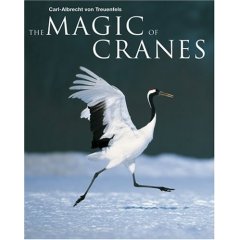

 Maggie, the beloved elephant at
the Alaska Zoo, has been at the center of a debate over whether
or not she should be in this state for years.
Maggie, the beloved elephant at
the Alaska Zoo, has been at the center of a debate over whether
or not she should be in this state for years. LISTEN AT WORK...all day long. Fresh animal programming 24/7.
Be sure to
LISTEN AT WORK...all day long. Fresh animal programming 24/7.
Be sure to 
 An appeal to a Conditional Use
Permit (CUP) granted by Morrison County to Gary McDuffee to operate
a large-scale, commercial dog breeding facility (a.k.a. "puppy
mill") was filed on Tuesday, May 29 by attorneys representing
neighbors to McDuffee's property. The neighbors have already
successfully appealed an earlier permit.
An appeal to a Conditional Use
Permit (CUP) granted by Morrison County to Gary McDuffee to operate
a large-scale, commercial dog breeding facility (a.k.a. "puppy
mill") was filed on Tuesday, May 29 by attorneys representing
neighbors to McDuffee's property. The neighbors have already
successfully appealed an earlier permit.
 A company in Japan has been selling sheep as
poodles.
A company in Japan has been selling sheep as
poodles.  Did you know the hippopotamus
has a starring role in the Bible?
Did you know the hippopotamus
has a starring role in the Bible?
 Meow
Madness 2007
Meow
Madness 2007 Chain
Off 2007 · Unchain the 50!
Chain
Off 2007 · Unchain the 50! Bottled
water has become a big business for health conscious consumers.
Now those same consumers can buy a healthy vitamin-enriched water
for their dog or cat.
Bottled
water has become a big business for health conscious consumers.
Now those same consumers can buy a healthy vitamin-enriched water
for their dog or cat.
 Get
ready for spring by protecting your dog and your family
against intestinal worm infections! Did you know that eggs
and larvae that infect dogs can survive in the environment for
months even in extreme winter weather conditions? And that
those same parasites can also infect humans? Why take chances?
Make intestinal deworming an important part of your dog's routine
health care with Safe-Guard® Canine Dewormer a safe
and effective way to eliminate and prevent the major intestinal
worms that can infect dogs all year round. Just sprinkle it on
your dog's food twice a year, for complete peace of mind!
Get
ready for spring by protecting your dog and your family
against intestinal worm infections! Did you know that eggs
and larvae that infect dogs can survive in the environment for
months even in extreme winter weather conditions? And that
those same parasites can also infect humans? Why take chances?
Make intestinal deworming an important part of your dog's routine
health care with Safe-Guard® Canine Dewormer a safe
and effective way to eliminate and prevent the major intestinal
worms that can infect dogs all year round. Just sprinkle it on
your dog's food twice a year, for complete peace of mind! Dear Bird Folks,
Dear Bird Folks, Fido
Friendly magazine lists accommodations where you can stay with
your dog while traveling in the United States and Canada. Each
quarter, our editorial includes hotel, city and state reviews.
Fido
Friendly magazine lists accommodations where you can stay with
your dog while traveling in the United States and Canada. Each
quarter, our editorial includes hotel, city and state reviews. We
all agree that one dog bite is one too many.
We
all agree that one dog bite is one too many. Any
dog can bite - just look at the close-up photo of Cosmo, our
Miniature Apricot Poodle... a wonderful 'softie', except when
he has bitten us (several times in the past) a few groomers,
a neighbour (twice) and yes - A RANGER! (but the ranger did
say afterwards they approached him the wrong way!)
Any
dog can bite - just look at the close-up photo of Cosmo, our
Miniature Apricot Poodle... a wonderful 'softie', except when
he has bitten us (several times in the past) a few groomers,
a neighbour (twice) and yes - A RANGER! (but the ranger did
say afterwards they approached him the wrong way!) Hate goodbyes? So does your dog.
When you rush off to work each morning, all it takes is one mournful
glance or a sorrowful howl from your dog to cause those guilt
pangs to rise inside you. You feel a bit bummed that you must
leave your canine pal home alone for hours.
Hate goodbyes? So does your dog.
When you rush off to work each morning, all it takes is one mournful
glance or a sorrowful howl from your dog to cause those guilt
pangs to rise inside you. You feel a bit bummed that you must
leave your canine pal home alone for hours. FINAL POOP
FINAL POOP  *
ADVERTISING OPPORTUNITIES for 2006 ANIMAL RADIO®
PROGRAMMING available. Call 435.644.5992. Animal Radio® Network, according to Arbitron radio
ratings, is the most-listened-to animal programming in the United
States. We have 250,000 Average-Quarter-Hour listeners - which
translates to an audience of two-million weekly in ninety-plus
cities. Our affiliate stations are top performers including KOST
103.5 and KBIG 104.3 in Los Angeles. Animal Radio® is the most concentrated radio audience
of targeted animal lovers anywhere! Please contact us for aggressive
and omnipotent branding and cultivating customer loyalty. Advertising
opportunities in this newsletter are also available. 38,000 subscribers
are reading this message right now!
*
ADVERTISING OPPORTUNITIES for 2006 ANIMAL RADIO®
PROGRAMMING available. Call 435.644.5992. Animal Radio® Network, according to Arbitron radio
ratings, is the most-listened-to animal programming in the United
States. We have 250,000 Average-Quarter-Hour listeners - which
translates to an audience of two-million weekly in ninety-plus
cities. Our affiliate stations are top performers including KOST
103.5 and KBIG 104.3 in Los Angeles. Animal Radio® is the most concentrated radio audience
of targeted animal lovers anywhere! Please contact us for aggressive
and omnipotent branding and cultivating customer loyalty. Advertising
opportunities in this newsletter are also available. 38,000 subscribers
are reading this message right now! * If you're
a RADIO PROGRAMMER and would like to air ANIMAL RADIO® - call 435-644-5992 to get all the information
you need to begin broadcasting America's number one animal talk
show geared to listeners that like to have FUN! Animal Radio® programming is FREE for your station
- and delivered via Satellite (Jones and ABC/NY Starguide) or
Compact Disc or MP3 every week.
* If you're
a RADIO PROGRAMMER and would like to air ANIMAL RADIO® - call 435-644-5992 to get all the information
you need to begin broadcasting America's number one animal talk
show geared to listeners that like to have FUN! Animal Radio® programming is FREE for your station
- and delivered via Satellite (Jones and ABC/NY Starguide) or
Compact Disc or MP3 every week.